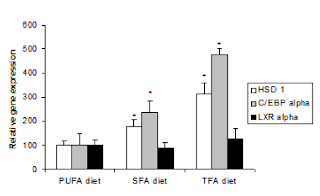A very recent investigation found a possible explanation for the protective effects of high PUFA consumption against adiposity and the metabolic syndrome. On the cellular level, PUFA decreases an enzyme, called 11beta-hydroxysteroid dehydrogenase type 1 (11beta-HSD1), which amplifies intracellular glucocorticoid action by converting inactive glucocorticoids to their active forms in vivo.
 |
| Figure 1: Effect of Diet high in PUFA, SFA, TFA on enzyme activity (HSD1 basal = 10%). |
The scientists explain that, in mice, "adipose-specific overexpression of 11beta-HSD1 induces metabolic syndrome [...], whereas 11beta-HSD1 null mice are resistant to it." For the average human being this means avoiding overgeneration of this enzyme may well keep him/her lean. And in fact, the most effective way to do so, is to follow the general advice to avoid trans-fatty acids (TFA) and saturated fatty acids (SFA) and consume polyunsaturated fatty acids (PUFA) instead:
11beta-HSD1 gene expression was significantly higher [than baseline 10%] in TFA rich diet-fed rats compared to SFA rich diet-fed rats, which in turn was significantly higher than PUFA rich diet-fed rats. [...] We propose that TFAs and SFAs increase local amplification of glucocorticoid action in adipose tissue by upregulating 11beta-HSD1 by altering C/EBP--gene expression. The increased levels of glucocorticoids in adipose tissue may lead to development of obesity and insulin resistance, thereby increasing the risk of developing metabolic syndrome.



